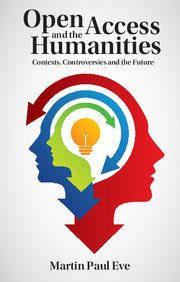Glossary of open access terms
- article processing charge (APC):
a supply-side (i.e. author-side, institution-side or funder-side) payment to publishers to cover the business costs of their work in order to achieve gold open access
- book processing charge (BPC):
an ‘article processing charge’ for a book
- CLOCKSS:
a digital preservation initiative. Acronym for Controlled Lots of Copies Keeps Stuff Safe
- Creative Commons licenses:
a series of licenses designed to allow greater reuse of material than is purely allowed under fair dealing/fair use provisions of copyright law
- digital preservation:
the practice of ensuring the continued existence and accessibility of digital material. This often takes the form of decentralised, highly distributed and redundant dark-archive systems, such as CLOCKSS and LOCKSS.
- disciplinary repository:
see ‘subject repository’
- Document Object Identifier (DOI):
an identifier in the form 10.7766/orbit.v2.1.50 or http://dx.doi.org/10.7766/orbit.v2.1.50 that uniquely addresses a scholarly resource. The DOI system is part of the digital preservation infrastructure as, in the event that a journal goes offline or the publisher folds, the DOI is updated to point to the preserved version, ensuring continued access. A DOI is supposed to be an identifier that will always return the resource and it comes with substantial social structures (such as financial penalties if metadata are not kept up-to-date) to ensure this.
- double dipping:
an instance when a hybrid journal that levies an article processing charge also charges for subscriptions without offsetting the subscription price to reflect revenue claimed from the APC
- embargo:
a delay period required by some publishers before they will allow open access (green or gold) on a piece of work. The embargo period for journals that allow green OA can be found on the publisher's website or by using the SHERPA/RoMEO tool.
- gold open access:
scholarly material made open access directly on the publisher's website. NB gold open access does not refer to any specific business model.
- gratis open access:
open-access material that is free of charge to read but with no additional permissions granted to redistribute, reuse or modify. Some refer to this simply as ‘open access’.
- green open access:
scholarly material made open access by deposit in a repository. NB green open access does not refer to any specific business model.
- hybrid journal:
a subscription journal that offers an open-access option
- institutional repository:
an archival space hosted by a higher education institution to facilitate green open access
- libre open access:
open access that is free of charge and that has lowered permission barriers. Some use simply ‘open access’ to refer to this.
- LOCKSS:
a digital preservation initiative, acronym for Lots of Copies Keeps Stuff Safe
- mandate:
a requirement that work be made open access, usually requested and enforced by a government, funding body or institution
- metadata:
peripheral information about an object, in this case a scholarly resource. For instance, author, affiliation, title, date published, journal name, issue, volume etc. are all pieces of metadata pertaining to a journal article.
- open access (OA):
the removal of price and permission barriers to research through the use of the internet and more liberal licensing agreements. See also ‘green open access’ and ‘gold open access’. For open access that distinguishes between the types of permission, see ‘gratis open access’ and ‘libre open access’.
- platinum open access:
a category-error term that supposedly denotes gold open access for which there is no author charge. In reality, this is just gold open access. See also ‘article processing charge’.
- Portico:
a digital preservation initiative
- post-print:
- pre-print:
a manuscript that has not yet been peer-reviewed
- repository:
an archival space to facilitate green open access. See also ‘institutional repository’ and ‘subject repository’.
- self-archiving:
the process of an author making his or her work green open access by depositing the work in a repository
- subject repository:
an archival space hosted by a subject group or learned society to facilitate green open access
- toll-access journals:
journals that charge a subscription or one-off fee for access



